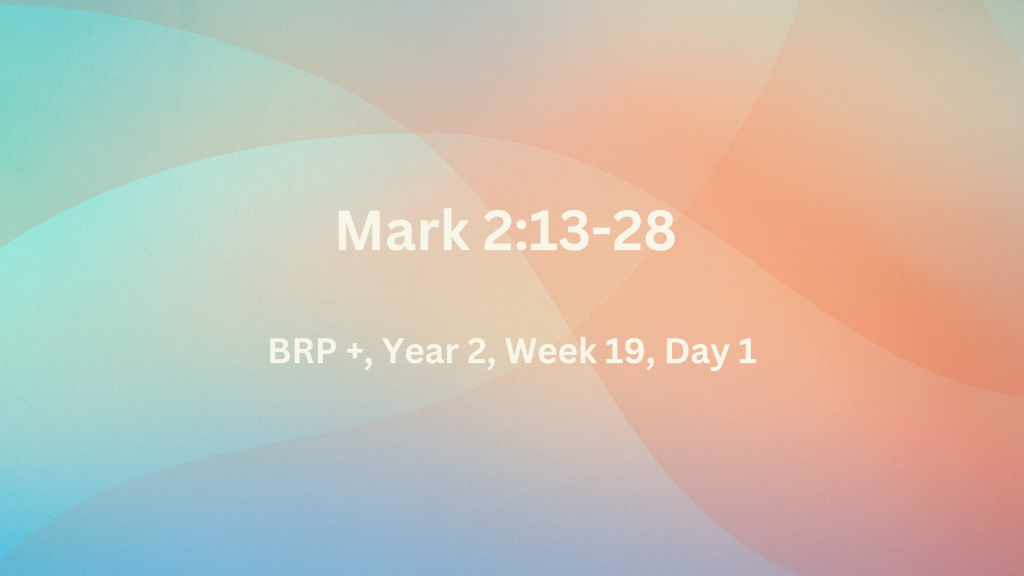Mark 2:13-28
Q .1. What was Jesus doing on the shores of Galilee? Why was it surprising that He called Levi? Was Matthew Levi ashamed of Jesus? Why were the Scribes and Pharisees upset? How did Jesus respond? – (Mk.2:13-17)
Capernaum was a fishing village on the north shore of Galilee, where Peter and Andrew lived. The crowds flocked to Jesus. He retreated to the Sea of Galilee and taught the people there (Mk.2:13). Tax collectors were unpopular, so it may have seemed strange for Jesus to call Matthew Levi to be His disciple (Mk.2:14). We soon learn that Levi had many friends whom Jesus wanted to reach – and it happened that He was reclining at the table in his house, and many tax collectors and sinners (irreligious Jews) were dining with Jesus and His disciples… and they were following Him (Mk.2:15). Such people were repelled by the religious leaders, whereas Jesus was like a magnet to them. That is why the Scribes and Pharisees complained to His disciples about the company Jesus was keeping (Mk.2:16). Jesus gave them a classic reply – It is not those who are healthy who need a physician, but those who are sick; I did not come to call the righteous, but sinners (Mk.2:17). Consistent with His call to the neediest, Jesus was seeking out those who readily accepted the fact that they were lost (Lk.4:18; 5:27-32). Since these leaders considered themselves righteous, they denied their need of the Saviour.
Q.2. Why did the Pharisees question Jesus? What did Jesus mean by His answer? Was Christ’s message new? How did He illustrate that the old and new do not mix? – (Mk.2:18-22 c.f. Mt.5:17-20)
Judaism had become preoccupied with religious works and outward observance. The Pharisees, as well as John’s disciples, practised fasting, whereas the disciples of Jesus did not. They quizzed Jesus about this omission by His disciples (Mk.2:18). He responded by drawing attention to the celebratory role of the attendants of a bridegroom while they are together. Fasting would be appropriate when the bridegroom was gone (Mk.2:19-20). He was alluding to His own departure as the heavenly Bridegroom (Mk.2:20). When He was gone … or seemed far away, then fasting would be appropriate. Jesus was in the process of ushering in the new Covenant of the Spirit which would make these rules obsolete (c.f. 2 Cor.3:4-6; Heb.8:6-13; 10:15-18). He then used two illustrations to show the inappropriateness of trying to patch up the old system with something so radically new. You do not use a new patch to fix and old garment, nor do you put new wine into brittle old wineskins (Mk.2:21-22). The two just do not mix.
Q.3. Were the disciples of Jesus working on the Sabbath? How did Jesus justify the actions of His disciples? Why did God provide man with the Sabbath? How is the Son of Man Lord of the Sabbath? – (Mk.2:23-28)
The story that followed demonstrated how ridiculous the interpretations of the Pharisees were. The disciples of Jesus were no longer shackled to the old rules. They were innocently eating grains of wheat (Mk.2:23). The Pharisees tackled Jesus about this breach of the Law (Mk.2:24). In response, Jesus set out the real purpose for the Law and the Sabbath. He reminded them about David and his companions … how Abiathar, the high priest provided them with the consecrated shewbread when in need (Mk.2:25-26 c.f. 1 Sam.21:1-6). The eating of this bread was reserved for the priests, yet no punishment was inflicted by God on David (Mk.2:26 c.f. Lev.24:5-9). Jesus was proving that the Law was not restrictive, but life-giving. He told them that – the Sabbath was made for (the benefit of) man, and not man (to be restricted) for the Sabbath (Mk.2:27). Beyond all that, He – the Son of Man is Lord even of the Sabbath (Mk.2:28).

